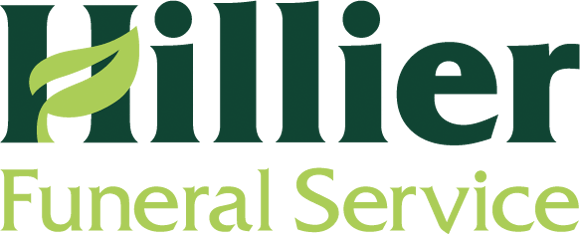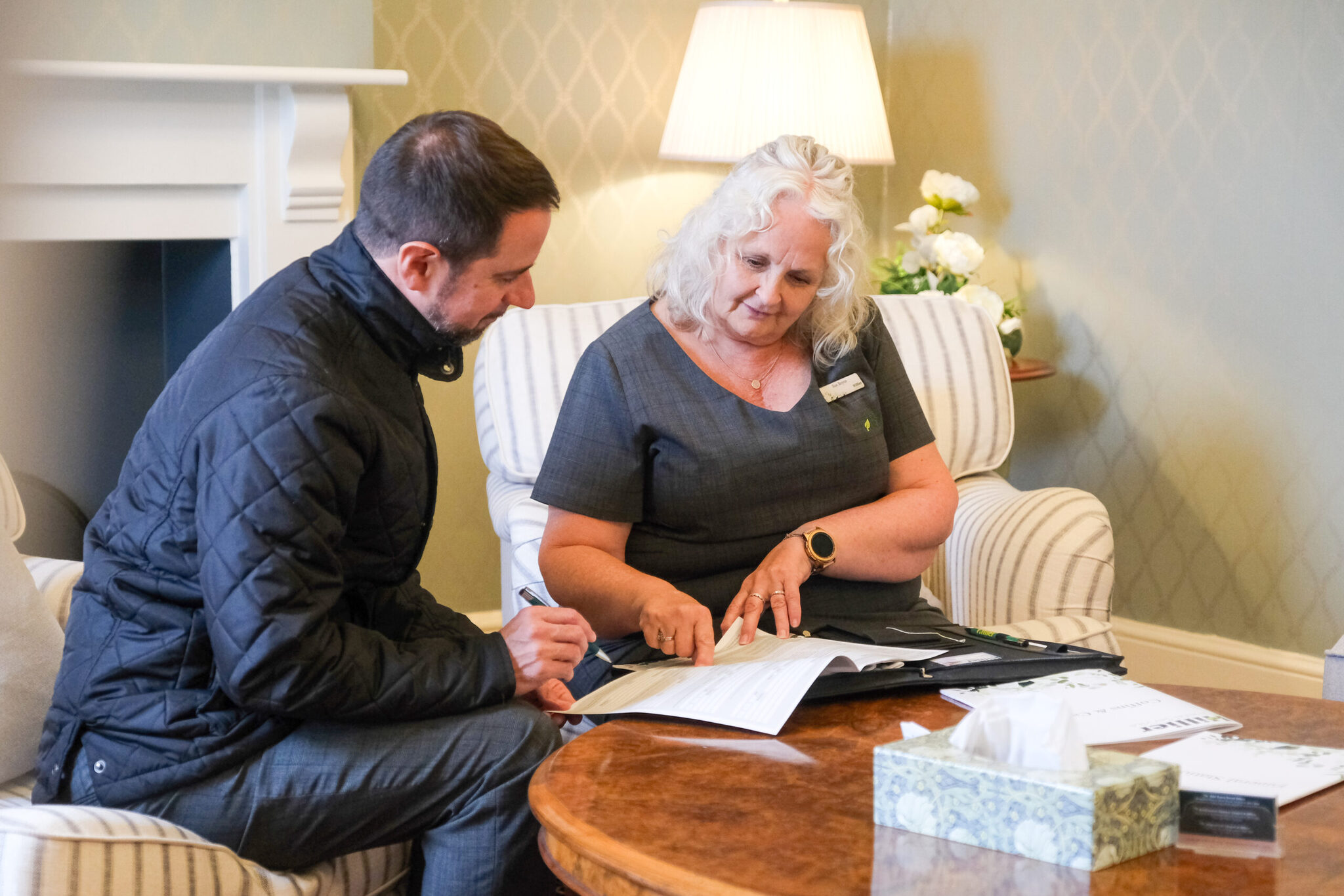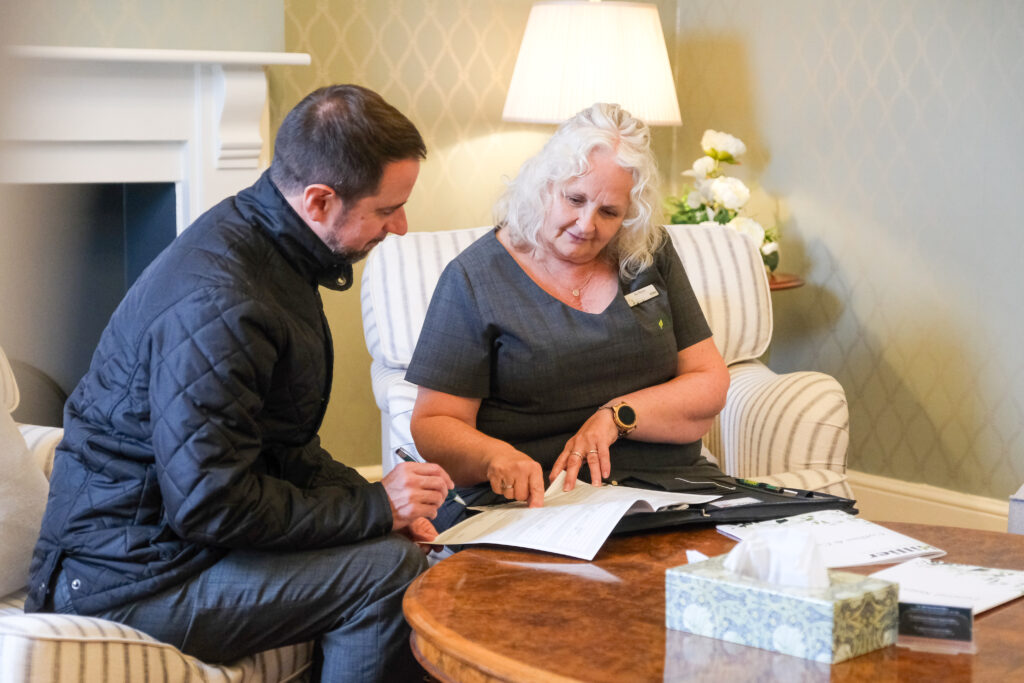Planning a funeral service can feel overwhelming during an already difficult and emotional time. You’re navigating grief while also having to make many important decisions.
At Hillier Funeral Service, our goal is to ease that burden. Having a comprehensive funeral service checklist can help ensure nothing important is overlooked while creating a meaningful and deeply personal tribute to your loved one.
We’re here to support you through the entire process, but you may find having a list of all the things you will need to consider when organising a funeral service, gives you some additional comfort and helps you feel more in control through this difficult time.
Our Funeral Service Checklist is broken down into the following steps , so you can easily navigate to the information you need.
- Essential First Steps and Administrative Tasks: including registering the death, deciding on a cremation or burial funeral and choosing and working with a funeral director.
- Planning a Funeral Service That Honours Their Life
- Personalisation and Special Touches
- Practical Arrangements and Logistics
- Budgeting and Affordability
- Final Checklist For the Day of the Funeral
Step 1: Essential First Steps and Administrative Tasks
These are the necessary, practical tasks that lay the foundation for the service. A funeral director can assist with many of these, but it helps to know what’s involved.
1.1 Registering the Death
Before any funeral arrangements can proceed, you must register the death with the local registrar within five days (eight days in Scotland). This is a crucial legal step.
You’ll need to gather the following documents for the registrar:
- The medical certificate of cause of death.
- The deceased’s birth certificate and marriage certificate (if applicable).
- NHS medical card and proof of identity.
The registrar will then provide you with the Certificate for Burial or Cremation (the green form), which is essential for the funeral to proceed.
1.2. Choosing the Final Resting Place: Burial or Cremation?
This is perhaps the most fundamental and personal decision in the funeral planning process, as it shapes the subsequent structure and logistics of the service. This choice should align with the deceased’s wishes, religious beliefs, and family preferences.
There Are Two Main Options:
- Cremation is the most popular option in the UK. It is the process where the body is reduced to ash at a crematorium. It offers greater flexibility in the service structure and location, and the ashes can be kept, scattered, or interred later. The cost is often lower than a full burial.
- Burial is the traditional option where the body is buried in a coffin or casket in the ground. This option provides a permanent, fixed location for a headstone and for future generations to visit and reflect, though it is typically one of the most expensive options due to grave purchase and maintenance.
Alternative Options:
- Direct Cremation is the least expensive and simplest option, where the deceased is cremated without a formal service or attendees present at the crematorium. Since it doesn’t include an immediate communal farewell, families often choose to hold a separate, less time-pressured memorial service afterward to celebrate the life.
- Natural or Woodland Burial is an environmentally friendly alternative to a traditional burial that uses biodegradable coffins and takes place in a natural setting. While offering a peaceful tribute, there are often restrictions on grave markers, usually limited to a simple plaque or a planted tree.
1.3 Choosing Your Funeral Director
A funeral director acts as your essential guide and coordinator during this challenging time. Choosing the right funeral director is crucial, as they will manage the practicalities with care and dignity.
- Advantages of a Local, Independent Director
While national chains exist, many families prefer to work with a local, independent, or family-run funeral director. These firms often offer several key advantages:
- Personalised Care: They are able to dedicate more time and provide you with personal attention and compassion to meet your family’s specific needs.
- Local Knowledge: They have deep knowledge of arranging funerals in the local area, as well as long-standing connections with local churches, crematoria, cemeteries, and venues, and other suppliers ensuring smooth coordination and compliance with regional regulations.
- Flexibility: Independent firms often offer greater flexibility in tailoring the service and sourcing unique elements to truly reflect the deceased’s life.
1.4 Working With Your Chosen Funeral Director
Once you have chosen a reputable funeral director, you should discuss and confirm the full scope of their services, which typically include:
- Collection and care of the deceased, ensuring they are treated with the utmost dignity and respect while being held in their climate-controlled mortuary facilities until the day of the funeral.
- Coffin or casket selection.
- Transportation arrangements for the deceased and the immediate family.
- Venue coordination and scheduling with the crematorium, cemetery and other venues.
- Assistance with legal documentation
Step 2: Planning a Service That Honours Their Life
We believe that every funeral should truly reflect the personality, values, and relationships of the person being remembered. We encourage you to take the time to consider what would have mattered most to your loved one, as well as what you as their family need from the funeral to help you begin to process their death and grief your loss.
2.1 What Type of Service?
You should consider which type of ceremony best reflects the deceased’s wishes and the family’s preferences:
- Religious service: A full traditional church service with established liturgy. Or a service which simply includes a few religious elements.
- Non religious ceremony: A simple, dignified service without religious content.
- Celebration of life send-off: A celebration focusing entirely on personal achievements and relationships of the deceased.
- Memorial service: This is held separately from the cremation or burial and often allows more time for planning and for more guests to attend.
2.2 Service Elements and Order
A funeral service typically flows through a few key components:
- Opening and Welcome – Processional music, welcome by the officiant, and opening words or prayers.
- Tribute and Remembrance – The eulogy (typically 5-10 minutes), personal tributes, readings (scripture, poetry), and musical selections/hymns.
- Reflection and Farewell – A moment of silence or prayer, a final tribute or blessing, and recessional music as guests leave.
Part 3: Personalisation and Special Touches
Adding unique elements turns a standard service into a lasting tribute that celebrates a life well-lived.
3.1 Music Selection
Music plays a crucial role in setting the atmosphere and expressing emotions. You might choose:
- Traditional hymns (e.g., “Abide With Me,” “The Lord’s My Shepherd,” “Amazing Grace”)
- Classical pieces (e.g., “Pachelbel’s Canon,” “Nimrod”).
- Popular songs that were personal favourites and held meaning for the deceased.
- Live performances from a musician or a musically talented friend/family member.
3.2 The Eulogy and Readings
The eulogy is often the most personal element of the service.
- Decide who will deliver it – family member, friend, or an officiant.
- Highlight key life events, achievements, and cherished personal anecdotes.
- Focus on the deceased’s values, passions, and their impact on others.
- Select meaningful texts for readings, whether religious scriptures, contemporary pieces about grief, love, and remembrance, favourite poems, or personal letters.
3.3 Visual and Unique Tributes
Consider incorporating elements that provide comfort and spark positive memories.
- Visual Elements: A photograph display showing life milestones, floral arrangements reflecting their favourite colours, or a display of personal items/collections that represent hobbies.
- Special Tributes: Unique options like a charity collection in lieu of flowers, a memory book for attendees to sign, or a digital tribute video/slideshow. You might even consider the symbolic release of doves or balloons.
Step 4: Practical Arrangements and Logistics
4.1 Venue Selection and Capacity
Choose a venue – be it a crematorium, church, or other hall – based on several practical factors:
- The expected number of attendees.
- Accessibility for elderly or disabled guests.
- Parking availability
- Audio-visual capabilities.
- Religious or cultural requirements
4.2 Timing and Scheduling the Service
Finding the right time for the funeral service is a delicate balance, requiring both emotional and practical consideration. Your funeral director will coordinate with the venue, but there are a few things to keep in mind:
- Allowing Time for Attendance: You will need to account for attendees’ travel requirements, especially if loved ones are travelling from far away.
- Cultural and Religious Needs: Ensure the chosen day and time account for any specific religious or cultural timing restrictions.
- Coordinating Venues: The funeral director will coordinate the schedule directly with the crematorium or cemetery to secure the booking.
4.3 Order of Service Booklets
These provide guidance and serve as a keepsake for attendees. They usually contain:
- The order of the service, including hymns/song lyrics.
- Biographical information and photographs.
- Details about the post-service gathering.
4.4 The Wake or Reception
Planning a gathering following the service allows people to share memories and offer comfort to one another in a more relaxed and informal setting. The things to consider are:
- The choice of a suitable venue, allowing for the expected number of guests
- Catering for guests, whether this can be provided by the venue, outside caterers, or whether the family provide this themselves.
- Decide on any entertainment, such as musicians, photo slideshows or videos.
- Decide on whether you want guests to write in a condolence book
Step 5. Budgeting and Affordability
Navigating the costs of a funeral can add stress to an already difficult time. Planning an affordable funeral does not mean compromising on dignity or love; it means making thoughtful choices that honour your loved one without creating financial hardship.
5.1 Cost Considerations and Financial Planning
Funeral expenses can be substantial, and it helps to understand the main elements involved. These typically include:
- Funeral Director Fees
- Crematorium or Burial Ground Charges
- Celebrant or Officiant Fees
- Coffin, Transport, and Flowers
- Catering and Venue Hire for the wake
- Legal Fees (e.g., death certificates)
5.2 Honoring the Deceased’s Wishes and Values
When making budgetary decisions, ask yourself: What would have mattered most to my loved one?
- Did they value simplicity over spectacle?
- Would they have preferred a large sum of money to be put toward a meaningful cause, a donation to charity, or perhaps saved for a grandchild’s education, rather than spent on a costly service?
The most meaningful services are those that truly reflect their personality and values. Choosing a service that aligns with their ethos is a deep act of respect.
At Hillier Funeral Service, we also have a funeral cost calculator that families can use to get an estimate of the funeral they would like to arrange.
5.3 Ways to Save Money on the Funeral
There are many practical ways to reduce costs while still creating a beautiful tribute:
- Consider Timing: Booking an early morning or late afternoon service slot, or opting for a day outside of the standard peak times, can result in meaningful cost savings due to lower crematorium/venue fees.
- Personal Contributions: Ask musically talented friends or family to perform, or have loved ones read poetry or personal letters instead of hiring professionals.
- Reduce Flower Costs: Request charity donations in lieu of flowers. Use simple, seasonal floral arrangements or potted plants.
- Manage the Wake: Instead of hiring an expensive venue and caterer, consider hosting the wake at home, a community centre, or a local pub with a simple buffet.
- Opt for Direct Cremation: As the lowest-cost option, this removes the need for a hearse, formal venue, and many associated fees, allowing you to hold a separate, less-expensive memorial at a later date.
5.4 Exploring Financial Assistance
If budgeting remains a concern, remember that financial support may be available:
- Explore the Funeral Payment from the Department for Work and Pensions.
- Check if the deceased had a pre-paid funeral plan, life insurance policies or pension fund death benefits.
- Opt for Direct Cremation: As the lowest-cost option, this removes the need for a hearse, formal venue, and many associated fees, allowing you to hold a separate, less-expensive memorial at a later date.
Step 6: Final Checklist For the Day of the Funeral
As the day of the funeral approaches, you may feel more nervous or stressed by the details of the funeral. Your funeral director is here to support you through these final days.
6.1 Final Family Responsibilities
To ensure the day runs smoothly, the family will need to finalise and provide the following personal details to the funeral director, and complete any outstanding communications:
- Service Details: Provide the funeral director with the exact details of chosen songs and any photos, slideshows, or videos to be shown during the service.
- Speakers and Performers: Confirm the final details with family members and friends who are reading or performing during the service.
- Communication: Ensure all attendees are informed of the location and timings of the day, and any post-service arrangements.
- Wake Details: Finalise and organise all the details for the post-service gathering, including the venue and refreshments.
6.2 Funeral Director Final Check-in Before the Day
In the days immediately leading up to the funeral, your funeral director will take the lead on all the final logistical checks. Their role is to provide you with peace of mind, ensuring every detail you have chosen is perfectly in place.
Your funeral director will initiate a final check-in with you to run through all the arrangements and offer reassurance, confirming that they have:
- Confirmed all venue bookings and timings with the church, crematorium, or other venue.
- Distributed the order of service details to all officiants, musicians, and readers.
- Arranged transportation and processional route for the deceased and (if requested) all required family members.
- Coordinated all flowers and tributes, and ensured the delivery times are correct.
- Coordinated with the celebrant or minister.
- Arranged for practical tasks to be undertaken on the day, such as playing music or showing photo slides shows or video displays.
Navigating loss is one of life’s hardest challenges.
Remember that you don’t have to do this alone; our experienced professionals are here to guide you through both practical arrangements and emotional challenges. Do not hesitate to contact us at Hillier Funeral Service, we are here to help you 24 hours a day.


